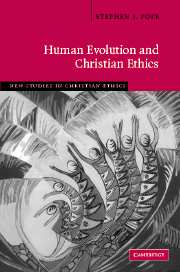Book contents
- Frontmatter
- Contents
- General editor's preface
- Acknowledgments
- Introduction
- Chapter 1 Evolution and religion
- Chapter 2 The indifference of Christian ethics to human evolution
- Chapter 3 Varieties of reductionism
- Chapter 4 Faith, creation, and evolution
- Chapter 5 Chance and purpose in evolution
- Chapter 6 Human nature and human flourishing
- Chapter 7 Freedom and responsibility
- Chapter 8 Human dignity and common descent
- Chapter 9 Christian love and evolutionary altruism
- Chapter 10 The natural roots of morality
- Chapter 11 Natural law in an evolutionary context
- Chapter 12 Sex, marriage, and family
- Bibliography
- Index of scriptural citations
- Index of names and subjects
Chapter 8 - Human dignity and common descent
Published online by Cambridge University Press: 26 June 2009
- Frontmatter
- Contents
- General editor's preface
- Acknowledgments
- Introduction
- Chapter 1 Evolution and religion
- Chapter 2 The indifference of Christian ethics to human evolution
- Chapter 3 Varieties of reductionism
- Chapter 4 Faith, creation, and evolution
- Chapter 5 Chance and purpose in evolution
- Chapter 6 Human nature and human flourishing
- Chapter 7 Freedom and responsibility
- Chapter 8 Human dignity and common descent
- Chapter 9 Christian love and evolutionary altruism
- Chapter 10 The natural roots of morality
- Chapter 11 Natural law in an evolutionary context
- Chapter 12 Sex, marriage, and family
- Bibliography
- Index of scriptural citations
- Index of names and subjects
Summary
This chapter is concerned with the dignity of the person in light of human evolution. It focuses on intrinsic human dignity as opposed to worth based on particular traits, such as social status, racial identity, income, or talent. The question here concerns whether the notion of human dignity is any longer viable, given our common descent from animals and, if so, how common descent ought to influence our interpretation of the meaning of human dignity and the ethical implications we draw from it. Widespread moral disagreement that characterizes modern pluralistic societies inclines us to take individual rights as our major moral reference point, and rights are usually said to have their moral justification in human dignity. Thus the Universal Declaration of Human Rights (1948) states: “All human beings are born free and equal in dignity and rights,” and all members of the “human family” share an “inherent dignity.” The “Universal Declaration of the Human Genome and Human Rights” approved by UNESCO in 1997 depended heavily on the notion of human dignity. The Preamble insisted that “the human genome underlies the fundamental unity of all members of the human family, as well as the recognition of their inherent dignity and diversity.” Article six of the Declaration denounced any discrimination on the basis of genetic traits as a violation of human dignity. It also forbade reproductive cloning and germ-line manipulation on the grounds that they are contrary to human dignity.
- Type
- Chapter
- Information
- Human Evolution and Christian Ethics , pp. 188 - 213Publisher: Cambridge University PressPrint publication year: 2007



